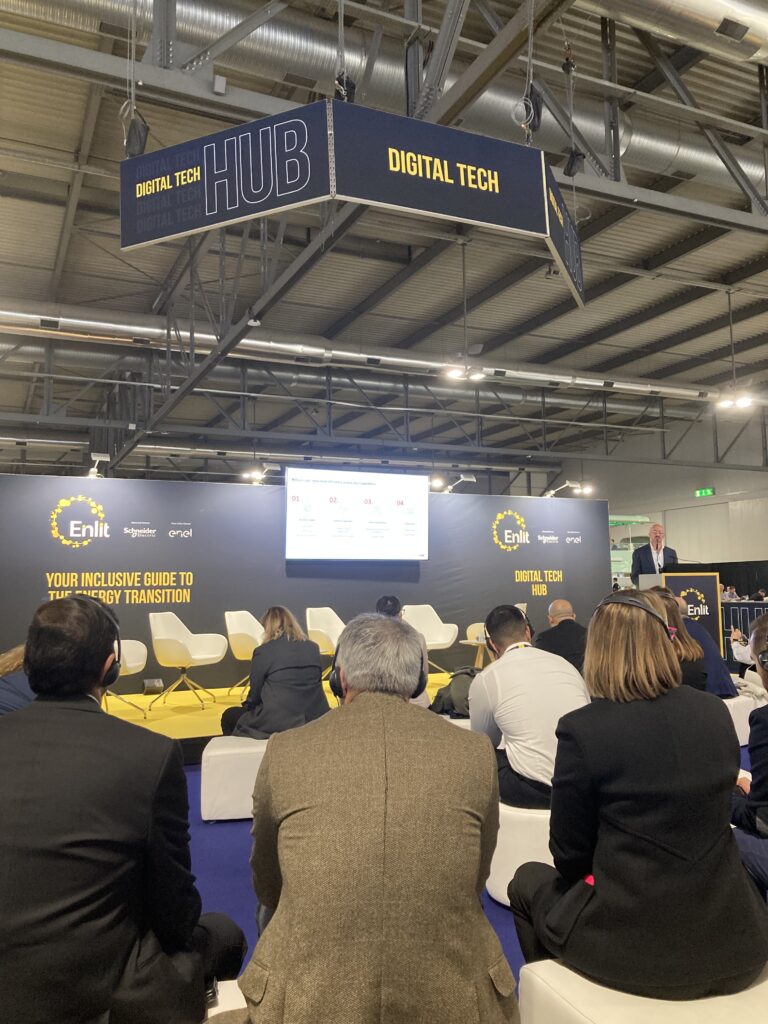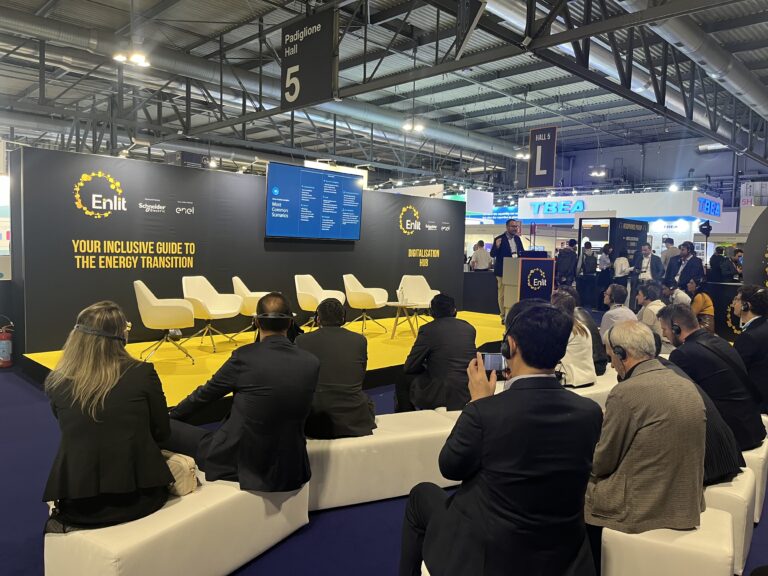Enlit Europe 2024, held from October 22-24 in Milan, brought together over 15,000 energy professionals, all united in advancing the energy transition. Key themes included digitalization, decentralized energy, and evolving grid technologies, with more than 500 speakers and 200 sessions offering insights into Europe’s energy future. Major topics of interest were the integration of renewables, the role of energy communities, system flexibility, and innovative financing models for essential grid upgrades.
Attendees at the event were immersed in discussions across multiple thematic hubs, each exploring advancements vital for a resilient, low-carbon energy future. Below are highlights from each hub, where participants had the opportunity to gain insights into industry innovations and collaborative approaches shaping tomorrow’s energy landscape.
Digital Tech Hub: Powering Infrastructure with Intelligence
Digitalization is at the heart of modern energy systems, and the Digital Tech Hub focused on integrating smart metering, cybersecurity, and AI-driven infrastructure to strengthen operational efficiency and predictive capabilities. Sessions showcased how digital tools are transforming maintenance, demand forecasting, and operational integrity, empowering customers with robust, reliable service. Attendees were able to explore how these technologies are enhancing infrastructure resilience and driving customer engagement, setting a foundation for a smarter, digitally connected energy future.
Regarding generative AI (GenAI), discussions addressed critical obstacles in scaling solutions, such as limited data integration capabilities and resource strain from evolving AI lifecycle tools. While productivity gains have been realized in business and IT functions, the development of broader AI skills has stalled. Looking ahead, it’s expected that by 2026, 40% of utilities will adopt GenAI, potentially improving asset restoration times and creating advanced knowledge platforms for field technicians.

Energy Democracy Hub: Empowering Community-Driven Energy
The Energy Democracy Hub explored the transformative potential of community-led energy models, focusing on peer-to-peer (P2P) trading, financing options for energy communities, and the evolving role of DSOs in facilitating energy sharing. Sessions featured innovative governance structures and funding mechanisms that empower communities to engage actively in the energy transition. Attendees gained valuable insights into how these approaches are enhancing local ownership, democratizing access to energy, and supporting sustainable, community-driven energy initiatives.
Topics around energy communities focused on addressing key challenges and advancing accessible, profitable community energy models. Discussions emphasized the importance of involving currently excluded groups, such as apartment residents, and streamlining participation processes to enhance engagement. Creating sustainable business models and providing real-time, comprehensive data access through plug-and-play platforms were identified as vital for ease of use and long-term success. Additionally, establishing a supportive regulatory framework, simplifying integration procedures, and increasing market flexibility were recognized as essential steps to expand community energy projects and encourage wider adoption.
Decarbonisation Hub: Scaling Net-Zero Solutions
With a pressing focus on decarbonizing industry and transportation, this hub emphasized the importance of carbon capture and storage (CCUS), sustainable heating, and alternative fuel technologies. Attendees gained insights into how sector coupling and scalable innovations in industrial heating can support high-temperature processes and reduce emissions across sectors like aviation and freight. These sessions underscored the collaborative solutions needed to help industries transition to net-zero targets efficiently and sustainably.
Digitalisation Hub: Modernizing Grid Operations for Customer-Centric Needs
The Digitalisation Hub showcased how DSOs are transforming operations to meet growing customer demands, with discussions on modernizing infrastructure to manage DERs and enhance service reliability. Attendees explored initiatives focused on automation, ADMS, and low-voltage monitoring, which prioritize grid reliability and customer service, from meter-to-cash processes to efficient customer connections. The growing shift towards decentralized energy was emphasized, with projections suggesting that in near future up to 70% of electricity will be delivered via low-voltage sources, creating a need for substantial reinforcement of existing grid infrastructure.
A core focus was the necessity of advanced grid management and monitoring technologies to address “blind” spots in energy transportation, which fall outside traditional grid boundaries. To achieve this, panelists highlighted the importance of collaboration between system operators and software providers to ensure regulatory transparency. Regulatory reform was also viewed as essential to support digitalization initiatives and update market design.
Cybersecurity emerged as a critical theme, with an emphasis on the grid’s reliability and the vulnerability of smart assets within the system. Safeguarding customer data privacy and obtaining consent for data use were also discussed as fundamental to building value-driven digitalization. Finally, the panelists noted the increasing frequency of cyberattacks, underscoring the need for robust digital defenses to protect Europe’s evolving energy infrastructure.

Enlit Europe 2024 reinforced the collaborative efforts necessary to realize a sustainable energy future. Methodia was honored to participate, gathering critical insights and exploring innovative solutions that will drive transformative change across the energy sector.




